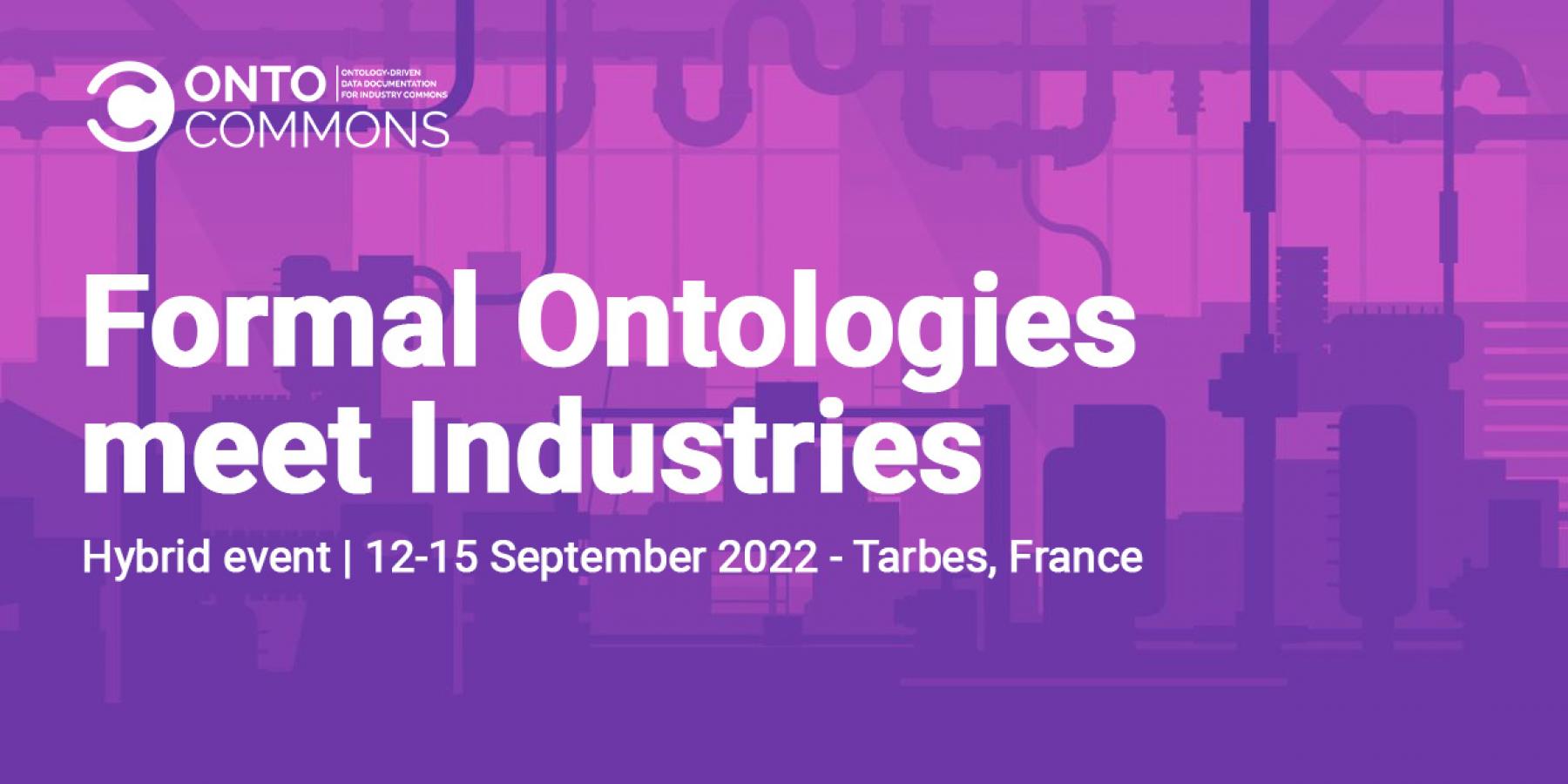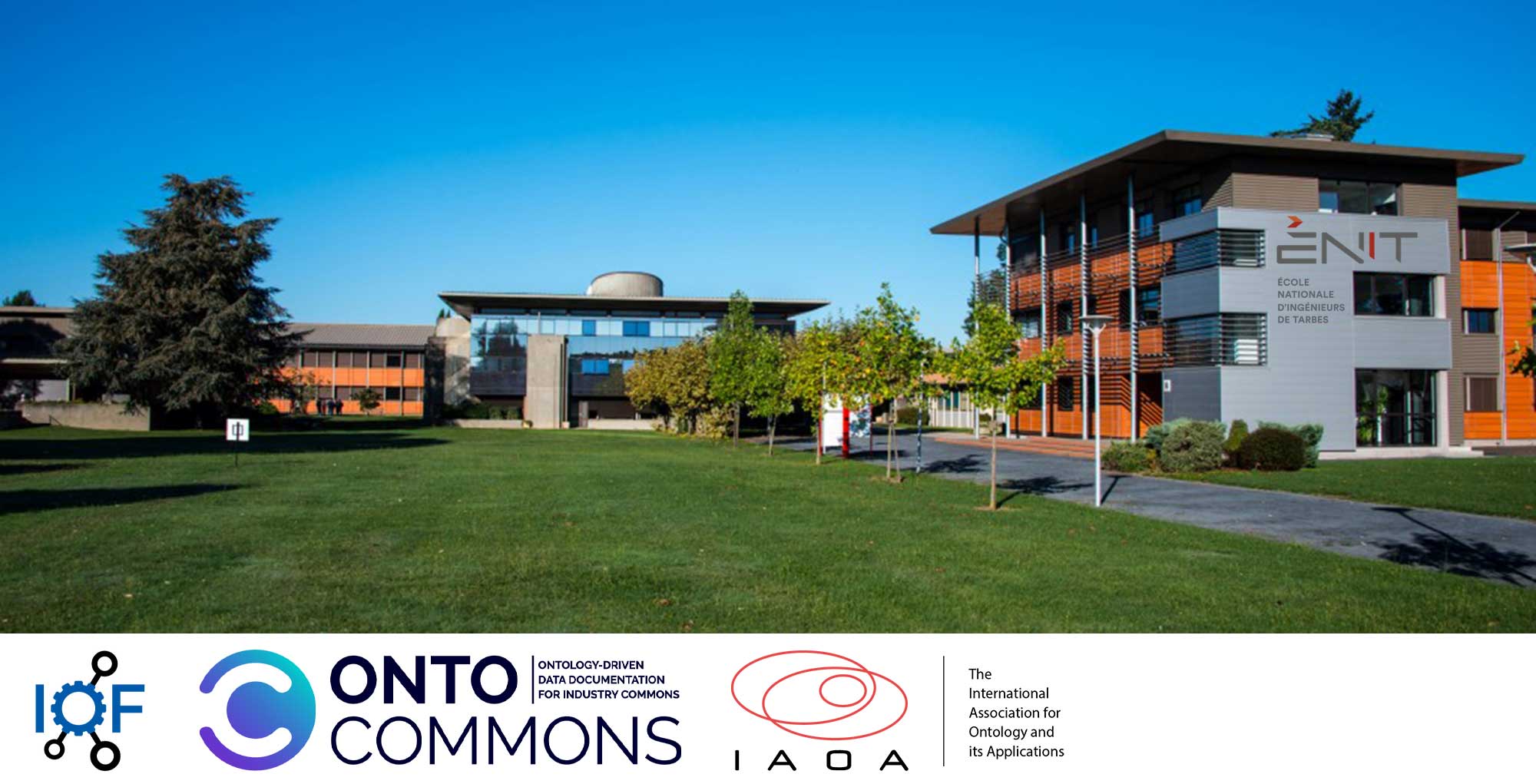
-
to
The "12th International Workshop on Formal Ontologies meet Industry (FOMI22)" is a hybrid event.
Index:
 Welcome to formal ontologies meet industry
Welcome to formal ontologies meet industry
Under the umbrella of the OntoCommons H2020 project, École Nationale d’Ingénieurs de Tarbes (ENIT), will host a 4-day event, featuring FOMI 2022 workshop, along with several sessions, organized by Industrial Ontology Foundry and OntoCommons, at Tarbes, France, from 12th to 15th September. The primary goal of this event is to provide a platform for academic researchers and industrial practitioners to meet to analyze and discuss application issues related to methods, theories, tools, and applications based on formal ontologies in the domains of manufacturing, materials, and supply chain.
FOMI is an international forum where academic researchers and industrial practitioners meet to analyze and discuss application issues related to methods, theories, tools and applications based on formal ontologies (visit https://iaoa.org/index.php/about/events/ for some information about the history of FOMI). There is wide agreement that knowledge modelling and the semantic dimension of information play an increasingly central role in a networked economy: semantic-based applications aim to provide a framework for reliable data and knowledge sharing, exchange, and integration, as well as for automated reasoning over knowledge and data, meaning negotiation and coordination between distinct organizations or among members of the same organization.
To achieve FOMI's mission, the 2022 edition will take place in tandem with other international events related to the use of ontologies and ontology-based information systems in the industry. These events are organized within the scope of both OntoCommons (EU H2020 project, https://ontocommons.eu/) and the Industrial Ontology Foundry (https://www.industrialontologies.org/). In this way, the workshop participants will have the chance of engaging with a broad community of international researchers, stakeholders, and practitioners in the industry to share experiences and insights, and discuss common research and application challenges.
Theoretical ideas are often promising but their actual implementation may bring up unexpected problems and issues. Every ontology development is also required to follow a robust technical principle regarding metadata documentation, licensing, version and release management to be sustainable for long-term use. Hence, the main purpose of this workshop is to collect and share useful experiences and lessons learned by the presentations from both academia and industry:
- New research results;
- New insights on known problematic issues;
- Experience with problems in ontology application;
- Successes and observations in ontology implementation;
- Lessons learned on the best way to apply ontological methodologies and tools to real-world situations;
- Demo of ontology-based applications in industry.
Similar problems arise in disparate application contexts and an open discussion helps to highlight commonalities and to spread ideas for possible solutions. We welcome researchers and practitioners that embrace this perspective without restrictions on the domains they deal with business, medicine, engineering, finance, law, biology, geography, electronics, etc.
Have a look at the list of topics for the workshop:
Problems in ontology application:
- Practical issues in using ontologies in enterprises;
- Real cases of successful/unsuccessful use of ontology;
- From legacy systems to ontology-driven systems;
- Application of FAIR principles for ontologies in the industry;
- Experiences acquired wrt ontology-based software applications (e.g., tools for developing ontologies).
Ontology and knowledge management:
- Ontological methodologies in data modelling and knowledge management;
- Adaptation of formal ontologies for companies and organizations;
- Ontology development and change within companies/organizations;
- Ontology effectiveness and evaluation;
- Ontologies for the know-how;
- Ontologies for corporate knowledge.
Ontology in practice:
- Ontologies for engineering (manufacturing, design, etc.);
- Ontologies for material science;
- Ontologies for electronic catalogues, e-commerce, e-government, etc.;
- Ontologies for marketing;
- Ontologies for finance;
- Ontologies for medical sciences;
- Ontologies for IoT.
Important dates
- 15 July - Authors notification
- 5 August - Camera-ready submission
- September 12-15 2022 - Workshop
Submissions
- Full research papers: max. 12 pages (including references).
- Short papers: max. 6 pages (but no less than 5 pages). This track is intended for researchers and practitioners who want to share their practical experiences with ontologies or ontology-based software. Authors of accepted works will be asked to provide a short demo during the workshop.
Please submit your contribution to EasyChair at the following link: https://easychair.org/conferences/?conf=fomi22 (paper template: CEUR-ART 1-column style, available at http://ceur-ws.org/Vol-XXX/CEURART.zip)
The workshop proceedings will be published in the IAOA series with CEUR-WS.org (http://ceur-ws.org/iaoa.html).
All the sessions will be recorded and all the recordings will be published on YouTube after the event.
 Program
Program
Click here to download the event program
 Location
Location

The workshop is planned to take place physically at the École nationale d'Ingénieurs de Tarbes (INP-ENIT), University of Toulouse, Tarbes, France. Updates will follow in the next months depending on the evolution of current international crises.
 Joint social events
Joint social events
- Lourdes is a french town in the Pyrenean foothills and one of the world’s most frequently visited pilgrimage sites.
 Committee
Committee
Workshop Chairs
- Hedi M. Karray, INP-ENIT, University of Toulouse, France (mkarray[at]enit.fr).
- Emilio M. Sanfilippo, ISTC-CNR Laboratory for Applied Ontology, Italy (emilio.sanfilippo[at]cnr.it).
- Arkopaul Sarkar (OntoCommons), INP-ENIT, University of Toulouse, France (arkopaul.sarkar[at]enit.fr).
- Dimitris Kiritsis (IOF), EPFL, Swiss (dimitris.kiritsis[at]epfl.ch).
FOMI Steering Committee
The FOMI series is supported by the International Association for Ontology and its Applications (IAOA; https://iaoa.org/) and organized by the IAOA-ISTC committee (https://iaoa.org/index.php/faq/industry-and-standards-technical-committee/). The current members of the committee are:
- Stefano Borgo, ISTC-CNR Laboratory for Applied Ontology, Italy.
- Michael Grüninger, University of Toronto, Canada.
- Amanda Vizedom, Credit Suisse.
Program Committee (to be updated)
- Bahar Aameri, University of Toronto, Canada.
- Emna Amdouni, ENIT, France.
- Farhad Ameri, Texas State University, USA.
- Stefano Borgo, ISTC-CNR, Italy.
- Ana Correia, ATB, Germany.
- Linda Elmhadhbi, INSA Lyon, France.
- Jesper Friis, Sintef, Sweden.
- Emanuele Ghedini, University of Bologna, Italy.
- Cheong Hyunmin, Autodesk Research, Canada.
- Dimitris Kiritsis, École Polytechnique Fédérale de Lausanne, Switzerland.
- Boonserm Kulvatunyou, National Institute of Standards and Technology, USA.
- Jinzhi Lu, EPFL, Switzerland.
- Riichiro Mizoguchi, Japan Advanced Institute of Science and Technology, Japan.
- Dimitris Mourtzis, University of Patras, Greece.
- Elisa Negri, Politecnico di Milano, Italy.
- Hervé Panetto, University of Lorraine, France.
- Pieter Pauwels, Eindhoven University of Technology, Netherlands.
- Arkopaul Sarkar, ENIT, France.
- Stefan Schulz, Medical University of Graz, Austria.
- Lorenzo Solano, Polytechnic University of Valencia, Spain.
- Dušan Šormaz, Ohio University, USA.
- Walter Terkaj, STIIMA-CNR, Italy.
- Marcela Vegetti, CONICET, Argentina.
- Alessandro Umbrico, ISTC-CNR, Italy.
 Venue
Venue
HOW TO REACH ENIT (47, avenue d'Azereix - BP 1629 - 65016 Tarbes CEDEX)
By road:
- Turn right towards Tarbes Town Centre at the first roundabout, then go straight ahead until you reach the university roundabout, then follow the signs to the university campus.
- The entrance to the university campus is a few metres further along on your left (drive past the Observatory and then take the first on the right to access the car park next to the gymnasium).
- ENIT can also be reached through the Place de l'Ingénieur entrance by driving a few hundred metres down the Avenue d'Azereix.
By air:
- Tarbes-Ossun-Lourdes Airport (8 km from the campus): once arrived, you can take a taxi or hire a car.
- Pau-Pyrenees Airport (45 km from the campus): once arrived, you can take shuttle buses or train to Tarbes (https://m.ter.sncf.com/occitanie/) or hire a car.
- Toulouse-Blagnac Airport (162 km from the campus): once arrived, you can take the bus or tramway from the airport to the SNCF (https://www.toulouse.aeroport.fr/en/transports/public-transport), and then take Shuttle buses or train to Tarbes (https://m.ter.sncf.com/occitanie/) or hire a car.
By Public transport:
- Grand Tarbes bus network: T3 goes from downtown to the university campus.
Your Covid-19 questions are answered here.
 Accomodation
Accomodation
The "12th International Workshop on Formal Ontologies meet Industry (FOMI22)" is a hybrid event.
